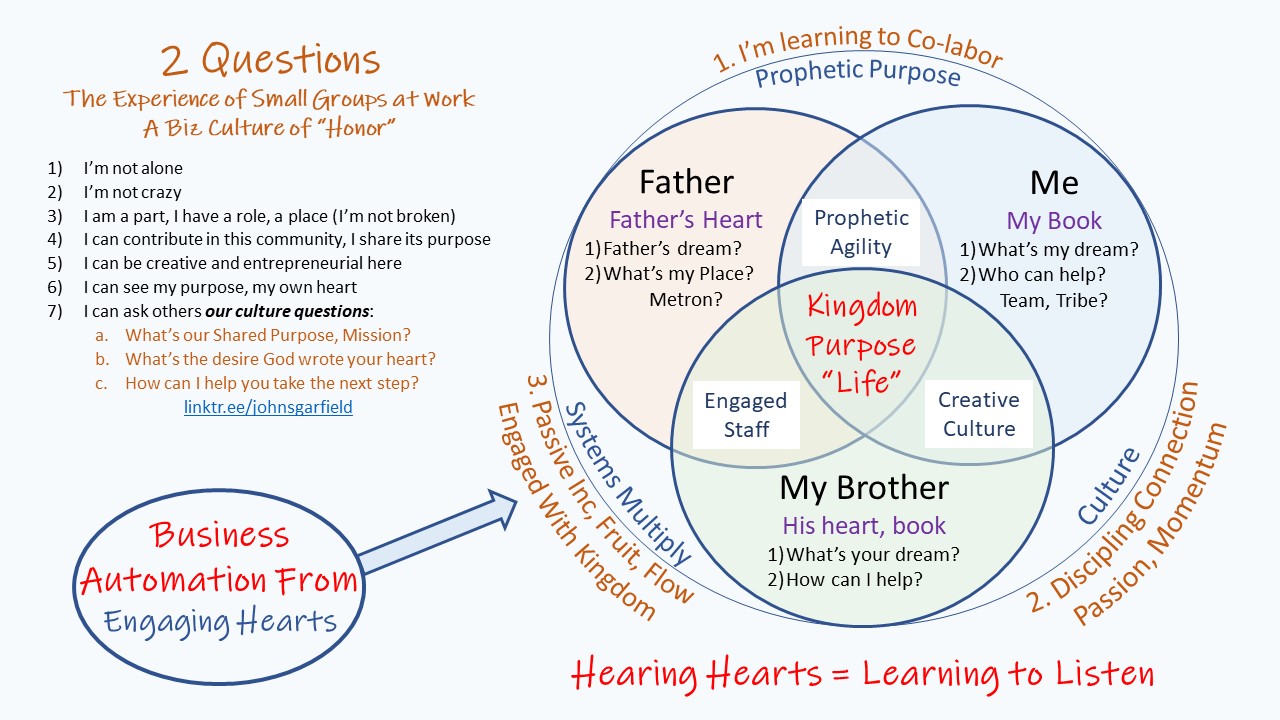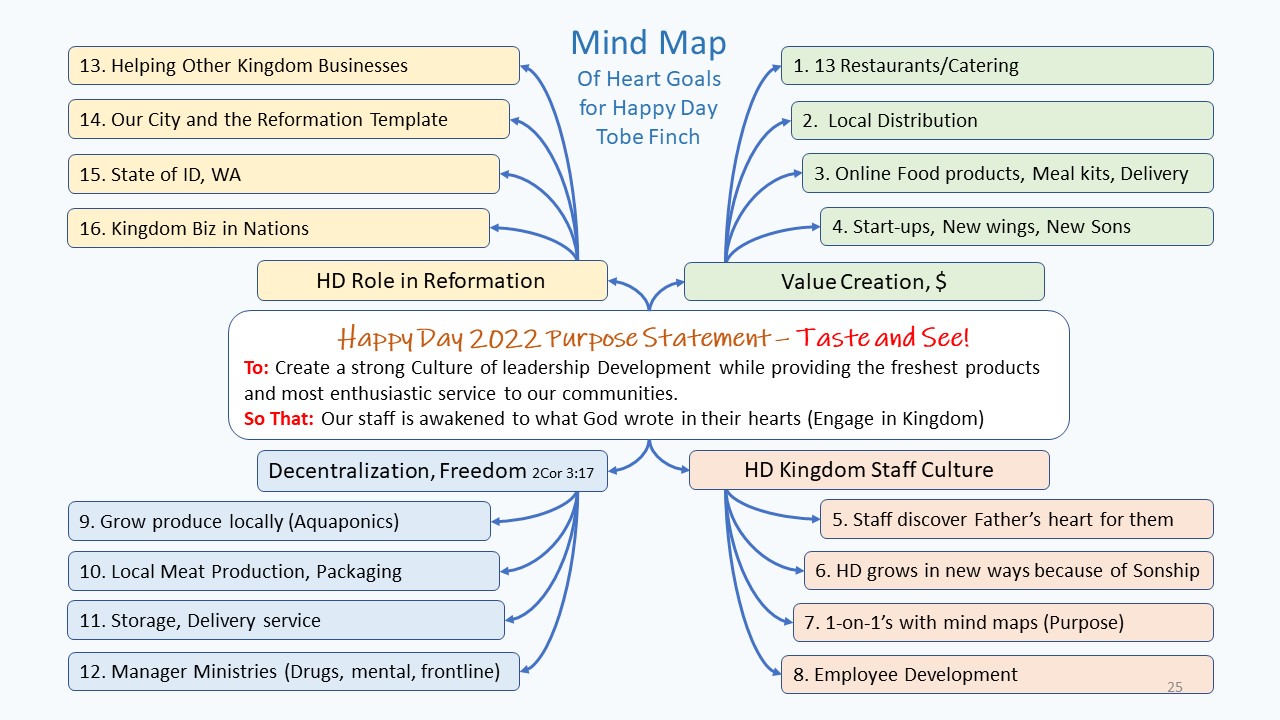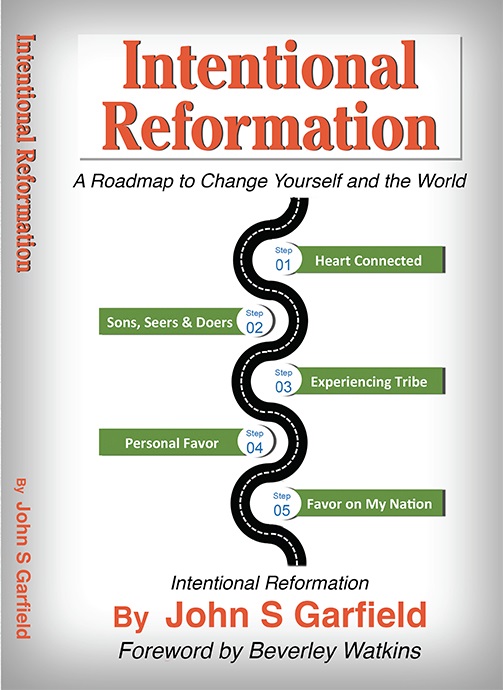Birthing a Kingdom Culture in a business has a clear goal that is very much on Father’s heart – Birthing sons instead of servants. We are not neglecting cash flow and traditional business metrics. We are just saying the best long-term strategy for a business is its Kingdom Culture. Are metrics for business culture and staff morale more important? First, two definitions:
Kingdom Business (definition) – Jesus is the King of kings (Rev 17:3). We are ‘kings’ with a small k and “sons.” We intentionally try to hear and see what Father is doing and collaborate with His strategy to bless people, businesses, and nations (Reformation). Kingdom is not religion or church; it is Christianity in culture.
Books (definition) – People and businesses have a story or calling that we call their “book” (Ps 137:15-16). It is their Purpose or assignment in God’s Kingdom to which that “son” is uniquely qualified and purposefully chosen by God. Therefore, we are intentional about opening books of people, businesses, and nations to cooperate with Father’s strategy for Reformation.
Leadership in a kingdom culture also has a different focus based on a few key concepts:
Sons – We’re releasing sons, not servants, and we place a high value on engagement, ownership, creativity, and initiative.
Ecclesia – Our business staff is an Ecclesia. They have books, and so does the business. Father is spearheading a reformation of people, businesses, and nations. We’re just doing it with Him. Doing what Father does is good for business, people, and profit.
Transformation occurs in small groups – Businesses thrive with good leadership, but business and people reinvention is a grass roots process fueled by the engine of small groups. The work teams led by first-line supervisors are where business and people transformation occur. As leaders, our inspiration, slides, and preaching genius aren’t quite as important as we thought! The job of leadership is creating culture through transformational experiences and questions that allow work teams to choose engagement. Culture is spontaneous; enthusiasm is infectious.
Mark 4:26-28 – This is what the kingdom of God (Kingdom culture) is like. A man scatters seed on the ground. 27 Night and day, whether he sleeps or gets up, the seed sprouts and grows, though he does not know how. 28 All by itself the soil produces… NIV
Purpose Is Heard – Revelation and change are rooted in heartfelt experiences. The sermonic drone of intellectual exhortations irritates sons and puts servants to sleep. Obedience is not a Kingdom motivation; love is. Hearts volunteer when the why resonates prophetically because God is saying it, too. People hear His voice mirroring what is already written in their hearts. Hearts hear Kingdom purpose. It’s life.
With the goal of culture, Kingdom leadership in a business takes on a different flavor.
1. Inviting peers into Purpose – We invite people into their own design. Start with the willing; they will convert the community, not you. Not everyone is saved, yet we are honoring what God wrote in their hearts and cooperating with whatever Father is doing in their lives. Culture is not built by management mandates to servants; we invite sons into their hearts and books. There is a thread between individual Purpose and the corporate Purpose of the business. It’s a potent motivational leverage that is easy to choose. We’re inviting people to choose what Father already wrote in their hearts. We helping them become themselves.
2. Designing experiences – Leaders design experiences and ask questions to help sons draw their own conclusions. We want them to think and pray for themselves. We help them make good decisions with positive consequences. We’re igniting a fire Father is already blowing on to bring Reformation, transformation, and reinvention. We’re focused on creating tools that increase relationships and minimize direction, always leveraging their Purpose.
3. People don’t want to be fixed; They want to be found – Kingdom leaders are not changing, fixing, directing, and solving other people’s problems. We help people solve their own problems by knowing their book or Purpose.
Prov 19:21 – Many are the plans in a man’s heart, but the purposes of God will stand
Prov 20:5 – The purposes of a man’s heart are deep waters, but a man of understanding draws them out.
Prov 25:2 – It is the glory of God to conceal a matter; to search out a matter is the glory of kings.
4. Discipleship – Leaders share their Purpose and dream until sons find their own. We’re not looking for clones around our Purpose or personality. Our value is sons connected with their own hearts and books. We want them to graduate into their Kingdom Purpose. There are no grandsons in the Kingdom.
5. Asking the right questions – Leaders sharpen their skill at asking the right questions to prompt self-discovery in sons (we’re releasing kings, not servants). We’re not trying to be an encyclopedia of correct answers with biblical proof texts to go with our recipe. (see cutting room floor for example questions)
-
- Questions are more transformative than answers and directions
- Questions prompt engagement and invite participation that respects the unique books in sons
- Leadership is not – just passing out mandates and directives to servants
2 Questions – We have a simple cultural exercise called “2 Questions:” What’s your dream? And, How can I help you take the next step? Knowing what’s in your book and the books of those you work with is the essence of relational Kingdom business culture. We even ask Father what’s in His heart so we can do it with Him. The glue in our relational work teams flows from the sense of laboring together on Father’s Purpose. It’s fun! It’s a cultural distinction that others can feel; that others can be invited into. It feels like love, and it flows from the sense of Father loving us. Father’s Kingdom theme is that it’s OK to be me and pursue the dream He wrote in my heart.

Thought questions:
-
Do unsaved people have a book? Can we help them open it?
-
If we do help them touch their book, do they feel loved? Does that experience represent an invitation to Father’s house (Kingdom evangelism)?
-
How do we connect an employee’s purpose with the business purpose? What’s the incentive?
Cutting Room Floor
Example tools – Questions are more transformative than answers
What stands out to you on Tobe’s mind map (another tool)? Why?
-
- Can you see yourself in one of the aspirations?
- Is there something important missing?
What does your mind map look like?
-
- What’s your mission / purpose?
- To______, So that ________?
- Where does it lead? What are your aspirations?
- How can we help you take the next step?
- Who is on your team?
- How many adults in your life see your heart and have your best interests in mind?



